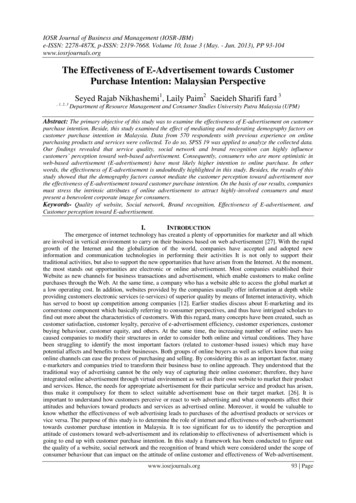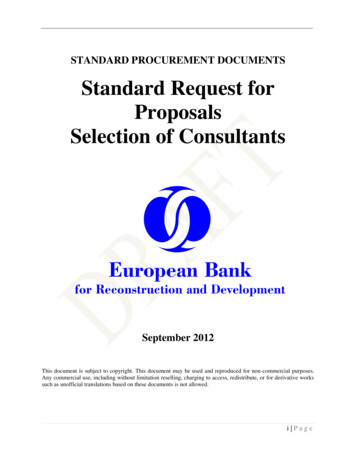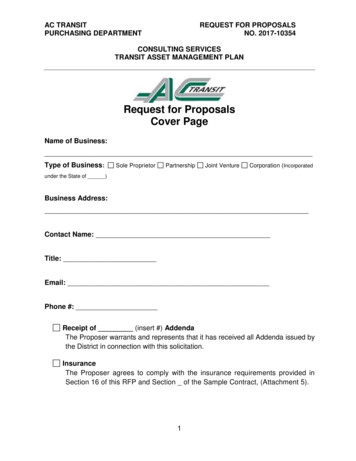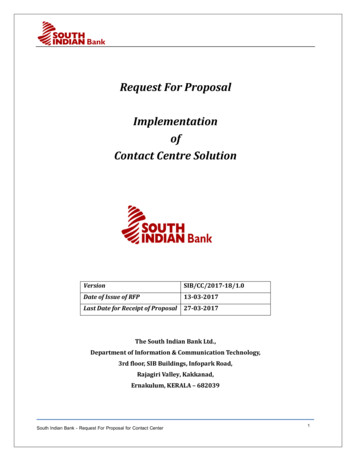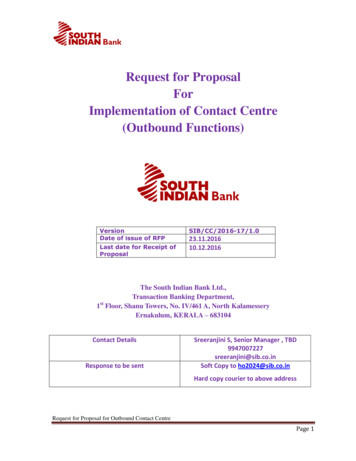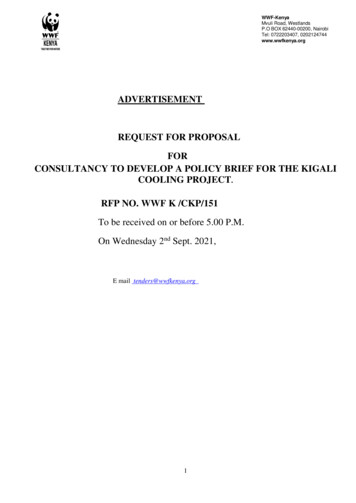
Transcription
WWF-KenyaMvuli Road, WestlandsP.O BOX 62440-00200, NairobiTel: 0722203407, 0202124744www.wwfkenya.orgADVERTISEMENTREQUEST FOR PROPOSALFORCONSULTANCY TO DEVELOP A POLICY BRIEF FOR THE KIGALICOOLING PROJECT.RFP NO. WWF K /CKP/151To be received on or before 5.00 P.M.On Wednesday 2nd Sept. 2021,E mail tenders@wwfkenya.org1
Letter of invitationWWF Kenya is in the process of sourcing for proposals for a consultancy services to Develop a Policy Brieffor the Kigali Cooling Project.)Prices quoted should be net inclusive of all costs and taxes, must be expressed in Kenya shillings and shallremain valid for a period of 120 days from the closing date of the tender.Interested eligible candidates should submit completed Proposal Documents marked with the Tender Name((WWF K /CKP/151 Consultancy to Develop a Policy Brief for the Kigali Cooling Project.) and Number,addressed to the procurement officer and sent by e mail to tenders@wwfkenya.org to be received on or before5 pm on 2 n d S e p t e m b e r 2021For any clarifications, please send your queries to kenya.procurement@wwfkenya.org not later than 2 daysbefore the closing date.2
TERMS OF REFERENCEFORCONSULTANCY TO DEVELOP A POLICY BRIEF FOR THE KIGALI COOLING PROJECT1. INTRODUCTION AND BACKGROUNDWWF KenyaWorld Wide Fund for Nature (WWF) - is one of the largest conservation organizations in the world. WWF-Kenyais a locally registered non-governmental conservation organization; an affiliate of World-Wide Fund for Nature(WWF). WWF has been active in the Coastal Region for almost 25 years working on the conservation andsustainable use of marine and terrestrial resources, responding to increasing pressures in the region. During thisperiod, WWF has supported the establishment and management of marine and terrestrial protected areas; facilitatedco-management systems for fisheries, developed and implemented management plans for resources and specificsites; contributed to improved livelihoods; and supported natural resource policy development with funding fromvarious donors.Project backgroundPost-Harvest Losses in the Fisheries SectorIt is estimated that about 47% of the country’s population is food insecure. About 2 million Kenyans are constantlyon food relief with the figure rising to almost 4 million during periods of shock such as drought and floods. Whereasthe fisheries sector plays an important role in contributing to food and nutritional security, the challenge has beenpoor post-harvest handling resulting in losses and a reduction in quality of the fish and fish products. Post-harvestlosses (defined as either entire losses of produce or a reduction in quality) are reported to go as high as 60-80% oflanded catches. Part of this can be attributed to inadequate handling of the catch after landing.Post-harvest losses originating from fishing are not only waste in terms of food security, but may also have negativeeffects on stocks and the wider ecosystem through food-web interactions. In order to increase food security andrealise the full benefits of catches, it is important to reduce any post-harvest losses to a minimum. This will requireimprovement in fish handling, processing and storage facilities. With appropriate storage and processing of fish,including at small local landing sites, chilled transportation and/or the development of (novel) fish products, postharvest losses could be reduced, new markets serviced and food security improved.While appropriate cold storage facilities are key to reducing post-harvest losses, it is evident that these have to gohand in hand with sound fisheries management and linking supply and demand as well some training programmeson fish quality and safety, responsible fishing, small-scale value addition and product diversification. It is againstthis background that this project was conceptualized.Kigali Cooling Project (The Project)The project piloted the use of clean, efficient cold storage facilities in Gazi and Ngomeni Beach Management Units(BMUs) in Kwale and Kilifi County respectively to demonstrate the impact that access to cooling can have in termsof reducing losses from fish catch, improving the livelihoods of fishers and strengthening sustainable fishingpractices. Ngomeni BMU benefitted from a solar-grid system whereas Gazi benefitted from a 100% solar poweredsystem.In implementing this project, we worked in partnership with Kenya Fisheries Service, fisheries departments in therespective county governments, the local community leadership of the BMUs and the relevant private sectorplayers.1
The project interventions were centered on the following objectives:1. Assessing the key constraints along the fisheries value chain on the Kenyan coast and identifying opportunitiesto reduce post-harvest losses through access to clean, efficient cooling.2. Piloted the use of efficient cooling solutions in select Beach Management Units (BMUs), building the capacityof those management units to maximize the impact of cooling on their livelihoods.3. Engaging local government to create an enabling regulatory environment for the adoption of efficient cooling inKenya’s coastal fisheries.4. Documenting and communicating the findings of the pilot project.2. OBJECTIVES OF THE CONSULTANCYThe objectives of the consultancy is to develop a policy brief for the concluded Kigali Cooling Project.The specific objectives are: To develop the policy brief through review of project documents and in consultation with the technicalteam. To lead a validation meeting for the policy brief.3. TASKS Have an inception meeting with WWF-Kenya team Finalize the policy development work plan Complete desk review of relevant project documents Develop a policy brief Finalize the policy brief based on inputs from stakeholders4. METHODOLOGY CONSIDERATIONSThe consultant is expected to develop robust methodologies to achieve the set deliverables of the assignment whichwill include but not limited to: Desktop study: Review of existing literature by WWF and other stakeholders fisheries post-harvest loss Facilitation of validation workshop (virtually)5. DELIVERABLESThe key deliverables for the assessment are as follows:a. An inception report with a detailed work plan and methodologyb. Policy Brief:The brief should be logically structured, contain evidence-based findings, conclusions, lessons andrecommendations, and should be free of information that is not relevant to the overall analysis. The brief shouldrespond in detail to the key focus areas described above. It should include a set of specific recommendationsformulated for the project, and identify the necessary actions required to be undertaken, who should undertakethose (If any)6. CONSULTANTS QUALIFICATIONSTechnical CapacityThe Consultant is required to have thorough experience developing policy briefs, working with governmententities, possess the ability to carry out research and conduct interviews and have a strong understanding of thefisheries sector in Kenya.The Consultant is also required to have in-depth experience in the usage of computers and office software packages(MS Word, Excel, etc.), the ability to carry out independent research and interviews and possess excellent writtenand spoken English skills.2
Education: Advanced University degree in natural resource management, fisheries, aquaculture and/or marine; public policy7. WWF KENYA RESPONSIBILITYWWF will:i. Avail all the project documents to support desktop reviewii. Organize the virtual validation meeting8. TIMEFRAME AND RESOURCES/COSTSThe prospective consultant needs to provide a tabulated timeframe/work plan for conducting the consultancy. Theexpected execution time for the assignment is five (5) working days.9. BUDGET REQUIREDThe budget to be submitted should only cover consultancy fees. The consultant is responsible for government taxesand insurances. WWF will deduct the statutory 5% withholding tax. Transport, accommodation and otherlogistical arrangements will be covered by WWF-Kenya as per WWF policy.10. REQUIREMENTS IN RESPONSE TO THIS TORThe consultant will be expected to take complete responsibility for all the activities identified in the Terms of reference(TOR). The Technical Proposal should contain: Consultant’s interpretation of the TOR. Complete description and elaborate explanation of the proposed methodology Names and qualifications of allocated personnel and any other resources that the consultant will make available toexecute the assignment and achieve the objectives. A capacity statement with short CVs of individuals to be involved in this assignment; Proof of prior experience in undertaking similar consultancies- 3 letters of recommendation; The financial proposal that should stipulate the consultancy fees for the assignment expressed in Kenya shillings. A detailed work plan within the stipulated timeline11. How to applyInterested consultancy firms/individuals should submit their technical and financial proposal. The proposal should be sentto: tenders@wwfkenya.org by 2nd September/2021. The subject line should be; be WWF K /CKP/151: -Consultancyto Develop a Policy Brief for the Kigali Cooling Project.Applications submitted without the required attachments will be disqualified.NB:Only shortlisted applicants will be contacted.We do not appreciate third-party mediation based on this advertisement3
((WWF K /CKP/151 Consultancy to Develop a Policy Brief for the Kigali Cooling Project.) and Number, addressed to the procurement officer and sent by e mail to tenders@wwfkenya.org to be received on or before 5 pm on 2nd September 2021 For any clarifications, please send your queries to kenya.procurement@wwfkenya.org not later than 2 days

